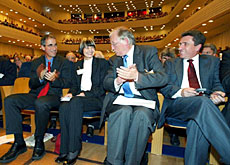
EU enlargement – is Switzerland missing the boat?

Switzerland needs the ten new European Union member states far more than they need Switzerland.
This was the main message to emerge from this year’s Europa Forum in Lucerne, which brought together political and economic leaders from Switzerland and five of the new member states.
The three-day Europa Forum, one of the major political and economic events on the Swiss domestic scene, was devoted this year to the theme of “EU enlargement and Switzerland”.
Günter Verheugen, the outgoing EU enlargement commissioner, set the tone in his keynote address on Monday.
“In economic terms, the integration of the new member states has achieved exactly the win-win situation we wanted,” he said.
“The new members will be able to catch up economically much faster than they would do otherwise, and existing members will profit from the effects of their accelerated growth.”
Positive effects
Swiss Foreign Minister Micheline Calmy-Rey stressed the positive economic effects for Switzerland of integrating the ten new member states who joined the EU in May.
However, she said this would depend on the latest bilateral agreements between Switzerland and the EU not being rejected in nationwide votes expected next year.
She estimated that implementation of the accords – particularly on the free movement of people between EU member states and Switzerland – would result in economic growth of between 0.2 and 0.5 per cent per year, or SFr1-2 billion ($0.8-1.6 billion) per year.
Jean-Daniel Gerber, Switzerland’s state secretary for the economy, also stressed the importance of the second round of bilateral agreements, saying rejection would be “an absolute catastrophe” that would leave Switzerland “completely isolated in Europe”.
Economic costs
During panel discussions, several representatives of the new member states emphasised the potential economic costs to Switzerland of not “seizing chances” in eastern and central Europe.
“Swiss companies tend to prefer trade to direct investment. This is a big mistake,” said István Major, deputy head of Hungary’s state secretariat for integration and external economic relations.
“In banking and financial services, where Switzerland really is a major global player, it is totally absent from the Hungarian market, unlike, for instance, France or Germany.
“I would say that this is a colossal mistake on its part. With hindsight, Switzerland has missed its chance – the most interesting positions are now occupied. That is a shame, because the average profit rate in the sector last year was about 50 per cent.”
Not aggressive enough
Major added that Switzerland had also lost out to Canadian companies in the field of supplying environmental protection technology, by not acting sufficiently aggressively.
Vlastimil Tesar, director of the Czech foreign ministry’s trade and agriculture department, agreed with this assessment.
“Swiss investors missed some big opportunities following the fall of the Iron Curtain, both in the Czech Republic and in other countries in the region,” he said.
He added that companies from France and Germany in particular had flooded the country with financial capital at the time of major privatisation prospects.
“This was not the case with Switzerland,” said Tesar.
swissinfo, Chris Lewis in Lucerne
The three-day forum, which ends on Tuesday, is devoted this year to the theme of “EU enlargement and Switzerland”.
It brings together political and economic leaders from Switzerland, Poland, Hungary, the Czech Republic, Slovenia and Lithuania.
All the participants, bar Switzerland, are among the ten countries that joined the existing 15 EU member states in May.
Participants at the Europa Forum agreed that Switzerland could not afford to isolate itself in Europe.
Swiss Foreign Minister Micheline Calmy-Rey and EU commissioner Günter Verheugen described closer economic ties as a “win-win” situation.
Representatives of new member states said Swiss firms had lost out economically by not investing directly in the past.

In compliance with the JTI standards
More: SWI swissinfo.ch certified by the Journalism Trust Initiative





























You can find an overview of ongoing debates with our journalists here . Please join us!
If you want to start a conversation about a topic raised in this article or want to report factual errors, email us at english@swissinfo.ch.